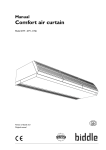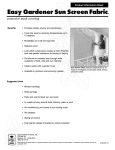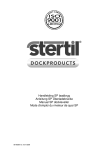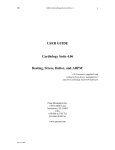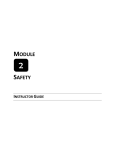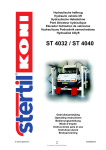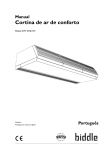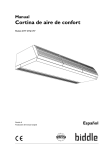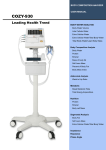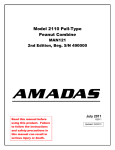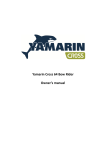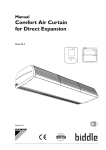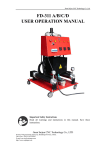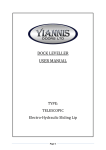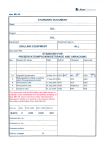Download HOW TO DESIGN A LOADING BAY
Transcript
THE STERTIL DOCK PRODUCTS HOW TO DESIGN A LOADING BAY STERTIL SUPERIOR SOLUTIONS BY QUALIT Y PEOPLE Superior solutions by quality people The Stertil Group offers its worldwide customers bespoke, technologically sophisticated solutions for their dock equipment and heavy duty lifting requirements, including the best possible service from strong local partners. These superior solutions are conceived, developed and realised by a team of specialised professionals with unique experience. Thanks to its “quality people”, its total in-house production process and its international organisation, Stertil is a world leader in the field of dock levellers and dock shelters. The loading bay is the logistical bottleneck of a company site The loading bay makes or breaks a logistics chain. Therefore, Different issues and factors will be discussed and explained in a lot of things have to be considered when designing a safe various chapters. Because of the diversity of circumstances and efficient loading bay. This guide will help you not only and environments in which docks are used, it is not possible to solve the most tricky problems but also overcome to reflect on every loading situation. However, if you need unexpected internal and external factors that can cause particular information or would like to receive more specific problems during the transfer of goods. details, please contact us. We will be happy to make an appointment with you to provide all the assistance you need. 2 logistics starts and ends with Index 1. 2. 3. 4. 5. 6. 7. 8. 9. The number of loading bays The site The loading pit The dock platform The dock leveller The dock shelter The overhead door Internal transport equipment Safety standard EN 1398 4 6 8 10 18 24 34 36 38 10. Ancillary dock products: A. loading pit constructions B. dock bumpers C. dock lights D. LA/HA mini dock leveller E. wheel guides F. truck restraint G. dock houses 40 40 42 43 43 44 44 45 3 THE NUMBER OF LOADING BAYS When determining the required number of loading bays, we recommend that you consider a range of factors that could influence both your current and future business plans. Traffic scheduling Processing of goods It’s important to be aware of how many vehicles Another factor to be considered is the way in are likely to be loaded/unloaded at the same time. which different goods may be handled. If processing Often, the busiest times at distribution centres occur activities, such as sorting, packing or labelling, need during the same morning and evening periods. to be carried out within the warehouse, it will be Of course, a balance needs to be reached that advisable to have a sufficient number of loading provides enough loading bays to cope with these bays to prevent internal handling equipment having busy periods without having many standing unused to transport goods over long distances. It therefore during the rest of the day. makes sense to position loading bays as near as possible to the areas where on site processing takes place. Receiving and Despatch Many companies rely on separate loading bays for receiving and despatching goods. Frequently, these loading bays are located on different sides of a warehouse to allow the smooth processing of goods in and goods out. This scenario also needs to be considered when deciding upon the number of required loading bays. Carefully determine the number of loading bays 4 5 THE SITE It is important to avoid bottlenecks as trucks arrive The road itself can be made of concrete, asphalt, on site to access loading bays. Properly designed concrete plates or brick/clinker paving. Whilst concrete road layouts that enable vehicles to travel quickly is an expensive option, it will not suffer damage and safely with a minimum of manoeuvring will help caused by the weight of vehicles and trailers. to eliminate the problem. Efficient traffic management, Also, the installation of wheel guides onto a concrete including strict control over the directional flow of road surface is straightforward. Good results have trucks, will also contribute greatly to safe and smooth also been achieved utilising concrete driving plates vehicle movement. For instance, in countries where providing these are placed on a well stabilized trucks are driven on the left, a clockwise system foundation. around a warehouse makes it easier for drivers whilst the opposite is true in countries where vehicles use When constructing a loading bay, it is advisable to the right hand lane. Also, this system ensures that incorporate personnel doors to allow drivers to enter drivers’ blind spots are eliminated when reversing the warehouse easily and safely. into position. During winter, snow and ice must be removed When designing a loading bay it is essential to take promptly from the parking and manoeuvring areas into account the different dimensions of trucks. In most to reduce the risk of accidents. As well as maintaining European countries, a truck with a trailer length of a ready supply of salt, it may be advisable to 18 metres is permitted. If you do not have accurate consider underground heating within the bay. information concerning your truck dimensions, you Many different systems are available and technical should assume that it meets maximum permitted advances mean that this can be an effective and dimensions. cost efficient solution. The parking and manoeuvring space in front of the dock should be twice the length of the largest truck plus two metres, e.g. an 18 metres long trailer requires a space of 38 metres. Furthermore, the minimum space between the truck and the dock wall should be 1.4 metres. 6 STERTIL SUPERIOR SOLUTIONS BY QUALIT Y PEOPLE 38 m 15 m 18 m Make sure you have enough space to dock your vehicle 7 THE LOADING PIT To reduce the difference in height between the yard and the truck floor, two options are possible: • raise the dock floor up to the level of the truck floor • wheeled loads can fall out when the truck’s doors are opened • the loading/unloading process is more difficult • internal handling equipment is under increased • create a depressed driveway approach. pressure • rainwater can run from the roof of the truck into The construction of the latter may be unsuitable due the building to soil condition or the ground water level. Also, a • the dock bumpers will be overburdened steep decline can create problems because when • damage to the overhead door and building. a truck is not horizontal during loading/unloading operations, the following problems might occur: Loading pit design Platform Gutter < 1000 mm 8 Approximately 17 metres STERTIL SUPERIOR SOLUTIONS BY QUALIT Y PEOPLE To solve the problem, depending on the yard, you can build a flat lane of 16-18 metres directly at the front of the dock before the slope begins. A drainage channel is necessary to remove rainwater. In this situation the truck is parked straight which will lead to smooth and simplified loading/ unloading. The height difference A good loading pit is straight and has a maximum gradient of 10% between the straight lane and the road should be bridged with a gradient percentage of a maximum of 10%. When this incline is larger than 10%, problems can arise as trucks drive in and out. In extreme circumstances, a truck cabin and trailer may even hit each other. max. 10% 9 THE PLATFORM Aim for the smallest difference between the average truck floor height and the platform 10 The platform There is wide variety in models and truck dimensions, so it is likely that trucks of different heights will park at the same dock. Special trucks, such as refrigerated trucks, will be higher, even when they are built on the same frame as other trucks, due to the insulated floor. To determine the average floor height of the trucks, you should look at the lowest loaded truck and the highest unloaded truck. However, it is advisable to omit occasional vehicles with extremely low or high floor when calculating the average floor height. To accommodate these special trucks, you may consider dedicating certain docks to ensure efficient loading and unloading. These docks could feature particular platform heights or longer dock levellers (also look at chapter DOCK LEVELLER). Of course, it is essential to minimize the gap between the average truck floor and platform height. The chart below shows how big the differences can be with various types of trucks. Truck floor heights in mm, 450 - 650 - 800 - 900 - 1.000 - 1.100 - 1.200 - 1.300 - 1.400 - 1.500 - 1.600 Volume-transport Delivery vans / city vehicles Trailers / refrigerated trucks Containers ~ 18000 ~ 16500 ~ 650 ~ 4200 ~ 1300 ~ 4000 ~ 4800 ~ 2950 Jumbo ~ 400 ~ 950 Double Decker Volume-transport ~ 18000 ~ 16500 Trailer ~ 4000 ~ 1300 Articulated Trailers / refrigerated trucks ~ 7150 ~ 6000 City vehicle Delivery vans ~ 4000 Demou n tables/ Con tain er ~ 1540 (1630) ~ 2000 Transit Van ~ 450 ~ 3400 City Vehicle ~ 1050 ~ 4500 Containers 11 STERTIL SUPERIOR SOLUTIONS BY QUALIT Y PEOPLE Dock leveller Letter box ≥ 400 mm ≥ 2400 mm It is not always possible to make an exact estimate This PVC seal bends away as soon as the truck of the kinds of trucks that will dock. However, the reverses. most common platform height is 1250 mm which is suitable for an average warehouse or trailer park. The letter box should be 3000 mm wide and have sufficient depth to accommodate the length of the Trucks with hydraulic tailboards need a space tailboards. However, we recommend a minimum under the dock leveller, known as a letter box. depth of 2400 mm and a minimum height of 400 mm The tailboard slides under the dock leveller into the (also depending on the build-in height of the leveller letter box to allow unrestricted use of the leveller. and chosen platform height). These dimensions will Letter box slots can be protected by a PVC seal that ensure that the letter box is easily accessible. prevents dirt and debris blowing into the opening. 12 The distance between parked trucks should be big enough to open and close the drivers’ doors. Too small a gap can cause problems with parking and driving out. Standard bay centres should be at least 3700 mm although, when accommodating wide trucks with open doors, this should be increased to approximately 4000 mm (except for refrigerated and freezer trailers - please see footnote). The recommended distance between the truck and the loading pit edge is 1500 mm. 4000 mm* 1500 mm * Most refrigerated & freezer trailers require a distance of 4200 - 4400 mm 13 STERTIL SUPERIOR SOLUTIONS BY QUALIT Y PEOPLE 4.1 The enclosed dock Here the trailer is parked inside the building or space. Also, a ventilation system is required. sheltered area during loading and unloading but However, it provides good protection for goods and the construction costs are high and there is limited personnel. 4.2 The flush dock In this situation, the truck backs up against the down onto the front of the dock leveller. In special building wall. The use of a dock shelter creates a cases, e.g. in a temperature controlled space, the seal between truck and building. This is the most seal may require extra attention. common installation and the overhead door closes 14 A line up with extra insulation can be applied in two different ways: A. A door in front of the dock leveller The door is installed in a tailor-made space and the leveller is positioned further back to allow the door to shut along the front side. If free access is required to the letter box, the door may be shut on an inter mediate floor. Since this would create a greater distance between leveller and truck, the leveller must incorporate a telescopic lip. This continuously variable, extendable lip can bridge the building, door and concrete construction without problems. 15 STERTIL SUPERIOR SOLUTIONS BY QUALIT Y PEOPLE B. T he dock leveller outside the building By using a dock house, the dock leveller is located in front of the insulated building thereby ensuring that high insulation values remain intact. The dock house construction may incorporate concrete and/or a steel framework. 16 Manoeuvring space depends on A A 4.3 A saw tooth dock In situations where manoeuvring space is limited, The trucks need less manoeuvring space because a saw tooth arrangement may be the best solution. they are already lined up in the ‘drive away’ direction. The manoeuvring space will be increased relative However, extra building space is required for this to the angle of the building. Approach roads need saw tooth layout and useable space between the to be designed in such a way that trucks can leave levellers is limited. in the direction of the angle of the dock. 17 THE DOCK LEVELLER The dock leveller The length of the leveller is closely connected to the height difference between truck floor and platform. Also, the maximum gradients should be taken into account when making calculations. They can be a determining factor as to what kind of internal transport equipment you may need. (More information is provided in chapter 8.) The width of the leveller depends on the internal width of the loading space of the vehicle, as well as the accuracy of the driver as he aligns his truck with the dock. The main consideration when operating a dock leveller is not the highest or lowest position, but the actual working range. The working range of an average leveller is about 300 mm above and below platform height. When you have a platform height of 1250 mm, vehicles with a floor height of 950 to 1550 mm can load and unload. When, for example, a 2000 mm long leveller has a working range gradient of 300 mm above platform level, or exceeds your internal transport equipment, you will need a longer leveller. The maximum legal gradient is 13%. (More information is provided in chapter 8.) Standard, multiple leveller widths are available between 1830 and 2250 mm. We recommend that you choose the largest width possible because it simplifies the placing of loads. Do not, however, choose the width of the leveller too close to the internal vehicle width because, frequently, a truck is not parked perfectly straight. A margin of at least 150 mm on both sides of the leveller is recommended. Wheel guides make it easier to park straight and the required margin can be made smaller. Read more in our Leveller brochure Example: The minimum internal vehicle width is 2400 mm Subtract a manoeuvring deviation of 150 + 150 mm This leaves a maximum leveller width of 2100 mm 19 STERTIL SUPERIOR SOLUTIONS BY QUALIT Y PEOPLE Choosing the correct type of dock leveller is just as important as determining the right dimensions. Stertil dock levellers include both manually and Unique open lip hinge electro-hydraulically operated models. Except for the electro-hydraulic telescopic lip operated leveller, all models feature a special open lip hinge. Because of the shape and place of the hinge plates, the top plate and beams have a weight absorbing construction. When the lip is vertical, dirt automatically falls through the openings, so a self-cleaning hinge is obtained. This is a big plus because, when dirt piles up, it can affect the smooth operation of the leveller. The Stertil patented open lip hinge has a lifetime guarantee. One hydraulic main cylinder To ensure stability when heavily laden fork lifts drive over a leveller in resting position, two legs support the front edge to prevent the leveller from sinking. When the lip extends, these legs automatically retract. Cross traffic is perfectly safe. The rear hinge is specially constructed to allow the platform to twist 125 mm on both sides. This means that an uneven truck floor will not cause a dangerous gap between lip and floor. The platform can twist 125 mm on both sides Two safety supports The lip angle is standard 7.5° 20 5.1The Hydraulic swing lip leveller Simple operation of the S / P Series leveller is achieved by pressing a button on the operating panel. The platform rises and, in the highest position, the lip hinges on its own. By operating the panel again, the platform returns to its original position. There is a cylinder on the front angle to support the platform completely in an ‘emergency stop’ situation. The hydraulic pump unit is mounted at the front and can be reached easily for maintenance and inspection. There are many sizes of hydraulic leveller, details of which you can find in our detailed brochure. 5.2The Hydraulic leveller with telescopic lip The S- P-Series levellers referred to previously all have a hinged lip. The X-Series dock leveller with telescopic lip, however, is operated using three buttons: • platform up • lip goes out • lip goes in The telescopic lip is continuously variable, making it perfect for all loading and unloading operations. This model is also suitable for an insulated environment where the dock leveller is positioned behind an overhead door (chapter 4.2a). During the transfer of goods, both the lip and platform will follow the movements of the truck. After loading/unloading, the leveller can be simply returned to its resting position. This leveller is available in more than 30 different sizes and full details are shown in our brochure. We have the perfect dock leveller for every application 21 STERTIL SUPERIOR SOLUTIONS BY QUALIT Y PEOPLE 5.3The Advantage of the Stertil Leveller with One Hydraulic Cylinder •High quality reliable high pressure hydraulic cylinder. •Ideal position under the platform to transfer all load forces from the platform to the frame and pit construction. •Maximum safety in an ‘emergency stop’ situation requiring just one cylinder to close. The combination of the middle position and high pressure ensures that the cylinder is capable of resisting the high impact from the falling platform and the load. 5.4Solutions for the food/ meat industry In food chain logistics, the highest standards are demanded in the loading and unloading of vehicles. To avoid sensitive loads being exposed to external influences such as temperature, dust, insects and birds, the aim is to create the optimum seal between trailer and building. This is possible with a 'cool chain' dock, which works as follows: •The dock leveller is specifically designed for this situation and is just under ramp level in resting position between two recesses in the front section of the warehouse floor. The sectional door closes in front of the leveller to exclude all thermal bridges. •The trailer docks with closed trailer doors. Picture 1 . •The inflatable dock shelter is activated and seals the trailer as tightly as possible. Picture 2 . •The sectional door of the warehouse can now be opened. Picture 3 . •Than the lip can be extended, covering the gap between the building and the back of the trailer. Picture 4 . The trailer doors can be opened safely and can be parked in the recesses provided on the ramp next to the leveller. Picture 5 . •With the leveller now released and the lip positioned on the lorry floor, loading and unloading can commence after the traffic light has turned green. Picture 6 . •As soon as loading or unloading has finished, the above procedure is followed in reverse order. Utilising specially-designed control software, this procedure can take place almost fully automatically. 22 FOOD/MEAT INDUSTRY 1 2 3 4 5 6 23 THE DOCK SHELTER The dock shelter Loading bays are exposed to all weathers. The use of shelters keeps adverse weather conditions outside by closing the gap between the truck and the building, restricting loss of heat. Dock shelters protect products by keeping out dust and insects, which is why the food sector in particular has made the use of shelters obligatory. With the gap around the loading or unloading trucks sealed, you have complete control of access to your warehouse, even with an open door. There are three types of dock shelters, namely: •inflatable shelters •curtain shelters •cushion shelters inflatable shelters e.g. WI, WIS curtain shelters e.g. WL, WE cushion shelters e.g. TP, TI Read more in our Shelter brochure 25 STERTIL SUPERIOR SOLUTIONS BY QUALIT Y PEOPLE 6.1 Inflatable shelters Inflatable shelters incorporate air cushions Because trucks enter the dock shelter before the positioned around the truck that are inflated by a shelter is inflated, there is no friction and therefore no fan. The pressure of the cushion against the sides wear on the material. Pressure on the facade with and the roof of the truck ensures a perfect seal. this type of shelter is minimal. When the shelter is not The fan provides a continuous air flow thereby in use, a large clear opening remains available, which guaranteeing a constant pressure of the cushions makes this type of dock shelter also highly suitable against the truck. When the dock shelter is not in for applications without loading bays, i.e. at road use, the inflatable components deflate neatly level. behind the front curtains in the housing made of 40 mm sandwich panels. High visibility indicators on the shelter assist trucks reversing. 26 6.2 Curtain shelters Exceptional versatility and relatively low price make This construction ensures that the frame will hinge this the most popular type of dock shelter. The curtains backwards when a misaligned truck fails to enter (available in different materials) are positioned at a the dock properly. If the truck does enter correctly, projection of around 600 mm from the facade. As the the frame remains at its standard projection at all truck backs up, the curtains clasp the sides and times. However, we recommend that every effort is roof, sealing the gap tightly. To assist trucks backing made to ensure that trucks always enter the bay up, the curtains feature high visibility indicators. correctly. Wheel guides offer a cost effective means The projection of a curtain shelter may be achieved of achieving this. (see chapter 10) by an inbuilt recess or a shelter frame which may be fixed or collapsible. The fixed frame consists of 40 mm sandwich panels and are supported by steel protection bumpers, the shelter forms a permanent unit within the facade construction. The collapsible frame, which is built from either galvanized steel or extruded aluminium profiles, is connected by means of hinged arms. 27 STERTIL SUPERIOR SOLUTIONS BY QUALIT Y PEOPLE 6.3.Cushion shelters 28 On loading bays supporting many trucks of mostly trucks can ‘bounce’ up and down. The special the same height and width, and where climate armour pleats at the front of the cushions are perfect control is vital, cushion shelters provide the best for dealing with these chafing movements, keeping solution. Cushion shelters ensure an almost airtight wear and tear to a minimum. For fleets comprising seal between the truck and the warehouse. trucks that are virtually the same in width, but with Because part of the load opening of the truck is great variations in height, a combination can be backed up against the cushions, this type of shelter supplied with an inflatable top cushion. The insulating is not suitable for companies where palletised loads cushion then provides protection at the sides while are being handled, as this increases the risk of the inflatable top cushion bridges any differences in damage. During loading and unloading operations, height. 29 STERTIL SUPERIOR SOLUTIONS BY QUALIT Y PEOPLE 6.4. T he dimensions of dock shelters When inviting an offer for dock shelters, the applica- little to do with the door. Furthermore, the door tion often refers to the dimensions of the door to be opening must be selected to fit the interior mounting included in the building. However, dock shelters have dimensions of the shelter. Key factors in deciding the dock shelter dimensions are: A the type of dock shelter B presence of bay or not, and its height C highest exterior truck dimensions, unloaded D lowest exterior truck dimensions, loaded E width of trucks, including doors opening outwards Dock shelters provide protection from moisture, wind, rain and insects to promote a healthier working climate 30 A The type of dock shelter C Highest truck 1) Curtain shelters The minimum height of the dock shelter is When determining the height and width, you should determined by the highest exterior truck dimensions take into account, amongst other things, that the when unloaded. highest truck must have a clearance of at least 300 mm from the top of the shelter and 200 mm from the sides of the shelter to prevent damage to the frame and/or curtains. 2) Inflatable dock shelters In the non-inflated condition, the trucks must stay well within the free opening of the shelter. The reach of the inflatable cushions must be selected such that D Lowest truck The length of the dock shelter top cushion/curtain is determined by the lowest exterior truck dimension when loaded. all available truck sizes are sealed. 3) Cushion shelters In a cushion shelter, the trucks must back up into E Truck width the cushion with their loading space edges. Cushion shelters are therefore usually smaller than the other types referred to above. Particular account has to be taken of the widest trucks with open doors. For example, refrigerator trucks with doors opening outward may have a B Presence or absence of a bay, and how high maximum width of around 2900 mm. Dock shelters may be used in situations without a loading bay (road level) and with a loading bay (dock level). For a dock shelter at road level, curtain shelters or inflatable dock shelters are the only option. The height of the shelter is therefore determined from the road level. In the case of a loading bay, the dock shelter is usually mounted with the bottom at dock level. The choice of the shelter dimensions is therefore influenced, in part, by the dock height selected. 31 STERTIL SUPERIOR SOLUTIONS BY QUALIT Y PEOPLE 6.5 E xample of calculating the dimensions of a curtain shelter Basic principles: •Highest truck 4100 mm, unloaded •Lowest truck 3600 mm, loaded • Bay height 1200 mm • Widest truck 2800 mm (with open doors) •Narrowest truck 2300 mm The minimum exterior height of the shelter must be: Highest truck 4100 mm Plus entry margin 300 mm Less bay height 1200 mm Total 3200 mm A standard height for curtain shelters is 3400 mm. The minimum exterior width of the shelter is determined as follows: Widest truck 2800 mm plus entry margin 400 mm (200 mm on either side) plus manoeuvring room300 mm (for truck driver) Total 3500 mm A standard width for curtain shelters is 3500 mm. Because a truck must bend back the shelter curtain some 500 mm, the net width between the side curtains must be 2150 mm to provide an adequate seal along the sides of the truck of 2300 mm. 32 33 THE OVERHEAD DOOR In order to complete a loading bay, an overhead TOO SMALL door is usually fitted. These doors, constructed from sections measuring about 600 mm high, are available Truck width in steel or aluminium. The counterbalance spring assembly, mounted above the door, makes it very easy to operate by hand. The door may also be provided with an electronic control. This will make its operation even easier, while it also allows for the possibility to connect the operation of the door in series with other dock products. The doors are available in different sizes, colours, and styles. The door must always be smaller than the interior of the dock shelter. The difference in dimensions is also determined by the presence or absence of a bay (is there a bay door or an entry door?). The minimum width of an entry door is 2400 mm while the height DOOR OPENING TOO SMALL ✘ lies between 4300 and 4500 mm. TOO SMALL The dimensions of a bay door are determined by: •Truck the height width of the bay CORRECT Truck width •the type and dimensions of the trucks •the type of goods •the type of dock shelters With curtain shelters and inflatable shelters, the width of the door must equal the internal width of the truck plus 300 mm. This tolerance is needed to unload trucks that are not centred in the door opening. Based on an average fleet, the width of the door can vary between 2800 and 3000 mm. DOOR OPENING TOO SMALL 34 DOOR OPENING CORRECT ✔ In the case of cushion shelters, the door width Another point to consider is how the loading bay equals the interior width of the shelter. The shelter door should rise when opened. Warehouses are size, in turn, depends on the truck dimensions. generally tall, enabling the door to rise vertically with The height of the door opening depends on the little or no travel back into the building. This reduces maximum truck height (3800 to 4200 mm). It is the risk of damage to the guide tracks by traffic wise to add a safety margin to the maximum height passing through the opening. - based on a bay height of 1250 mm, a door with a height of 3000 mm will suffice. In the case of curtain or inflatable shelters, door dimensions of 3000 x 3000 mm is a good choice 35 INTERNAL TRANSPORT EQUIPMENT As described earlier in chapter 5, the length of the With electric hand pallet trucks, the battery takes dock leveller is also determined by the type of internal over the operation. The maximum slope can then transport equipment being used. Such equipment be 5%. The steeper the slope, the more energy the is required to negotiate a slope during loading and battery must supply, and it will need recharging unloading operations. The steeper the gradient, more frequently. With an electric forklift truck, the the more energy is required to move the goods. slope can be no steeper than 10%. Here, too, The energy needed to operate a hand pallet truck the same points apply as with electric pallet trucks. is the pulling power of the employee. A forklift truck with a fuel engine (petrol/gas) has sufficient power to take a slope of up to 15%; however, the legal maximum is 13%. Example: Pushing a four-wheel cart, loaded with 270kg of goods, requires about 13.5kg pushing power. On a When a truck needs to be loaded above bay level, slope of 4%, this increases to 22kg pushing power, the platform of the dock leveller is placed at a certain and 40.5kg on a slope of 10%, i.e. three times as slope relative to the bay. However, the lip of the dock much. The maximum slope for a hand pallet truck leveller MUST always lie flat on the truck floor. If not, is 3%. dangerous situations can occur. Maximum slope percentage for internal transport equipment 36 hand pallet truck 3 % electric pallet truck 5% electric fork lift truck 10 % fork lift truck powered by fuel engine 15 % Hand pallet truck Electric pallet truck Electric fork lift truck Fork lift truck powered by fuel engine With the lip lying flat on the truck floor and the plat- (see A). The combination of wheel centres, diameter form at a certain slope, the LIP ANGLE is created. of wheels and clearance from the underside, deter- A standard lip angle has been selected such that, mines the maximum lip angle. For a pallet truck, the at a 13% slope, the lip lies flat, or 7.5º. The position lip angle cannot be 7.5º, but possibly 3.5º (see figure of the dock leveller whereby the lip lies flat is the at bottom of page). When the lip angle is reduced, effective range of the dock leveller. This means the slope whereby the lip lies flat will also become there is an important difference between the highest smaller. In other words, the leveller’s effective range position of the dock leveller and its effective range. is reduced and a different dock leveller model may With pallet trucks, the lip angle may cause problems be required. A Please be aware, that the different types of internal transport equipment require different slopes which also implicates that the lip angle (see A) must be adapted to the internal transport equipment 37 SAFETY STANDARD EN 1398 EN 1398 Directive is the European safety standard The control box of the dock levellers (minimum for dock levellers set up at the request of the EC protective class IP 54) must be equipped with an member states. The standard lays down a number emergency shutdown feature and a lockable main of points which manufacturers must meet with their switch. The coils of the electromagnetic valves must design, manufacture and mounting of products. be suitable for continuous use. Below we explain a number of these points. Various dock products The manufacturer must have the full technical docu- Naturally, the box must be placed in a location which mentation for each dock leveller, including points like provides a good view of the dock leveller during its stress calculations, cylinder buckling calculations operation. and a description of the safety features applied. Before a manufacturer markets a dock leveller, a All hydraulic components, such as cylinders and prototype must be tested by properly trained staff. pipes, must be able to resist at least twice the normal work load without causing damage or lasting The required load bearing capacity of a dock leveller deformation. is determined by the maximum weight (including load) of a forklift truck, measured over one axle of the truck. A user manual, instruction labels and name plate, The load is then measured over two 150 x 150 mm to be mounted on every dock leveller, will provide surface areas. the user with information about user regulations, manufacturer, country of origin, capacity and serial The capacity of the model in question must be numbers. established based on a shock factor of 1.5 and a safety factor of 1.33 compared to the yield point For a full version of the EN 1398 Directive, please do of the material. not hesitate to contact us. Clearly recognisable CE symbol 38 Because of the permanent 380/400 Volt set-up, the restraint systems. (For more information, see chapter INSTALLER guidelines apply to the installation of 10.) It is obvious that both government and leading dock levellers as well as certain shelters. Operation institutions have given a lot of thought to guidelines switches are one of the features that result from this concerning safety. In addition, there is a growing guideline. The Veterinary Service has laid down a number of companies that have their own specific number of requirements for certain sectors. In spaces policies covering such areas as safety, maintenance, where open foodstuffs are being processed, dock fire prevention and the like. It is important to match shelters have even been made obligatory. In many the operation of products to the regulations that cases dock levellers must be specially prepared, for apply to the relevant user, sector or application. example with hot-dip galvanisation. Last but not least, there is growing safety awareness, partly due to the new Labour Safety regulations, which stress improved security during loading and unloading. The accidental movement and early departure of trucks from a dock can be prevented by truck 39 ANCILLARY DOCK PRODUCTS A. Loading pit design There are many ways to design a dock leveller pit. They all depend on the specific wishes of the builder, customer and type of trailers that are being used. Pit construction In order to apply a dock leveller in the bay, a constructional recess will have to be made: the so called pit. Generally there are two different types of pits: 1.A closed pit in which the leveller will be installed on the concrete pit floor 2. A open pit in which a letterbox (tail lift opening) is integrated CLOSED PIT What type of levellers will be integrated in the pit depends on the type of dock leveller selected. The different options to choose are 1.The standing frame leveller for closed pit design 2.The conventional hanging frame leveller which will be casted in to the concrete, use in open pit design where a letterbox is required CLOSED PIT WITH LETTERBOX 3.When time is important we can offer a leveller which suits the QMS (Quick Mounting System) In case of using the Quick Mounting System, the pit is produced first with QMS curb angles, which makes it possible to place the leveller in QMS execution in the last stage. Curb angles OPEN PIT WITH LETTERBOX There are several types of curb angles available 1.The straight angle used to cover and protect the horizontal and vertical concrete edges of the pit. 2.The QMS version, the allow you to create the pit and fit the leveller at the end of the building process. The Stertil QMS curb angles protect the pit edges and also assure you the exact dimensions of the pit. Once the pit is completed it eases to fit the leveller and weld it to the curb angles. 1. STRAIGHT CURB ANGLES 2. QMS CURB ANGLES Closed box Another way to integrate a leveller into the pit is with a so called “closed box”. This galvanised “closed box” can be supplied completely assembled, including distance profiles which keep the walls at the exact position during the concrete casting process. Also levellers can be executed in a closed box execution and completely CLOSED BOX casted in. Prefabricated concrete pits Especially in big projects, it can be interesting to use pre fabricated concrete pits. These concrete pits are prefabricated in a concrete mill. Stertil can supply galvanised curb angles in the correct dimensions, directly to the manufacturer of these prefabricated pits. PREFABRICATED CONCRETE PITS 41 STERTIL SUPERIOR SOLUTIONS BY QUALIT Y PEOPLE B. Dock bumpers When a loaded truck backs up into the bay, it can impact heavily on the bay angle. Even docks of reinforced concrete can be damaged quickly. Trucks and loads are also likely to suffer damage. However, by installing dock bumpers, the impact force, and resultant damage, will be reduced tremendously. Stertil offers several dimensions and versions in its product range: •R-45-20-5 rectangular rubber model 450 x 200 x 50 mm •R-45-20-10 rectangular rubber model 450 x 200 x 100 mm •R-45-20-15 rectangular rubber model 450 x 200 x 150 mm •L-45-45-10 L-shape rubber model 450 x 200 x 100 mm •B-54-21-17 moveable rubber model 540 x 210 x 170 mm •PE bumper polyethylene wearing plate 554 x 220 x 140 mm Selecting the right bumper depends on many factors but principally on the loading pit and the type of shelter. With its extra large entry area, an L-shaped bumper model offers excellent protection. Dock bumpers are constantly subjected to heavy impact, particularly when trucks ‘bounce’ during loading or unloading. Also, the back of the truck chafes the front of the bumpers time and again. To reduce the risk of damage and extreme wear, Stertil has developed two solutions - a moveable bumper, which moves when hit by a truck, and a range of PE bumpers. These incorporate a front plate manufactured from Ultra High Molecular Polyethylene, rubber damping strips and a hot galvanised mounting console. Due to low friction properties and the durability of the front plate, the bumpers suffer minimum load forces and damage. The main advantage, however, is that the front plate can be changed quickly and simply without the need to drill new anchors or holes in the concrete. 42 C. L oading Bay Dock Lighting No more dangerous manoeuvring of heavily loaded forklift trucks in the gloom within a trailer - all goods and obstacles can now be brightly lit by a bay lamp. The hinged arms ensure precise positioning of the lamp to light up every corner. When not in use, the lamp is simply folded towards the wall. D. L A/HA mini dock leveller In places where only small differences in height need to be bridged, or where a concrete pit is not possible, a mini-dock leveller can provide the right solution. The STERTIL LA/HA Series mini dock leveller. HA is the hydraulic version mini dock leveller which can be simply mounted against an existing bay. Using an operating bar, the lip of the LA can be manually positioned on the truck floor within a matter of seconds. When the truck moves away, the lip will automatically drop between the mounted bumper consoles, ready for the next truck. 43 E. Wheel guides. Wheel guides, mounted on the approach to the loading bay, increase safety during loading and unloading and increase the life of dock shelters considerably. Trucks are forced to enter centrally and the rounded shapes of the steel wheel guides are safe to tyres, unlike the relatively sharp edges of concrete ramps. The recommended interior distance between the left and right wheel guide is 2600 mm. Wheel guides are easy to mount on concrete, concrete driving plates or in bases poured into the access route. F. Vehicle Truck Restraint System COMBILOK ® To manage business operations in a responsible manner, a reliable vehicle restraint system is a necessity within all loading bays. The risk of damage caused by accidents during loading and unloading activities increases significantly as a result of tight time constraints. The communication between warehouse staff and drivers (in their cabs) often leaves a lot to be desired. Prematurely driving away from the dock while the lorry is still being loaded or unloaded is not uncommon. The same applies when considering the risk of a docked lorry creeping forwards. The unique COMBILOK from Stertil limits all of these risks and offers many unique safety benefits. Read more in our COMBILOK brochure 44 G. Dock house A dock house is a construction combining a dock The dock house can be built with a substructure leveller and a dock shelter. It offers a good solution in steel or concrete framework. The top structure, for situations where pit recesses cannot be built, for comprising of hot-dip galvanised profiles, can be example in existing concrete bays. Cutting out floors clad with uninsulated sheeting or insulated panels. is often an expensive and awkward job. When a dock The size of the dock house will depend on the house can be placed against the existing facade, it shelter and dock leveller model selected. can be simply moved after a few years if required. In refrigeration and freezer applications, locating a dock house may involve specific considerations. In order to maintain the extra insulated construction, it is often better to place the entire loading and unloading unit outside the facade. 45 Designed to make it There is a support section "Architects Library" on our website available. You find there BIM (Rivet) files specially designed and created for architects and building engineers, also including our product brochures. Scan the QR code to go there! Further information For further or specific information about our products, levellers, shelters, dock houses, vehicle restraint systems, etc., please get in contact with us. We will be happy to assist you with personal advice to ensure that you receive a superior solution. A member of the Stertil Group A member of the Stertil Group 95004110 How-to-Design-GB 09-2015. Stertil is a registered trademark of Stertil B.V.. We reserve the right to make changes in specifications without notice and without making changes retroactive. Stertil B.V. P.O.Box 23 9288 ZG Kootstertille The Netherlands Tel. +31 (0)512 334444 www.stertil.com [email protected] Stertil Dock Products @Stertil
















































